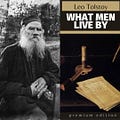What Dwells in the Heart of Man: Leo Tolstoy's 'What Men Live By'
I won’t lie, I’m not well-versed in Russian Literature, however, I’ve been aware of the name Leo Tolstoy for as long as I understood the beauty in literature when I was around 17. Now, I didn’t study his work in sixth form like many students across the UK, but Tolstoy’s literary legacy is undisputed with novels such as Anna Karenina and War and Peace especially being some of the most celebrated works not just in the Russian language, but in Western literary canon.
A few months ago, when I was seeing some of my close friends, one of them Miles (who also recommended Flowers for Algernon - he has good taste!) mentioned some of the short stories of Tolstoy, which prompted me to buy a couple of Tolstoy’s short stories when I was at Foyle’s buying birthday gifts, a couple of months later.
I’m familiar with one of Tolstoy’s short stories How Much Land Does a Man Need?, but this article will be about his story called What Men Live By.
What Men Live By is about an impoverished couple, Semyon (a humble shoemaker) and Matryona, who take in a mysterious figure called Mikhail - who happens to be an angel - and nurse him back to full strength and look after him whilst they struggle on as a married couple, ‘till death them do part.
Although the plot is very simple, it happens to be a brilliant platform for Tolstoy to explore the fundamental ideas that the story aims to address: man’s relation to his creator God, what dwells in the heart of man, the reality of the fallen world, and, of course, what men live by.
What Men Live By is wonderfully paced. The story unfolds seamlessly from the beginning where Semyon first discovers Mikhail to when Mikhail returns to God by the end. Although years pass as the story goes along, Tolstoy presents the story in a cohesive manner, with the characters’ maturation easily gleaned from the text. What helps the story’s fluidity as well is its simple language. It really lets the ideas breathe, and it makes reading the story a less jarring experience compared to some experiences I’ve had reading some of O. Henry’s short stories, for instance, as they sometimes suffer because of the odd polysyllabic word thrown in occasionally.
The characters are realised very well too, particularly thanks to Tolstoy’s use of the interior monologue. For example, in chapter three, when we get a glance of the lives of the married couple from Martyana’s perspective and we see that she’s hoping that her husband bought the sheepskin coat he was planning on getting, we get such a clear idea of the relationship dynamic between the two. We get the impression that Semyon probably punched above his weight in getting with Martyana given he calls him “so simple”, and that Martyana - trying her best to be supportive of her husband - often feels she’s misplacing her trust in him.
What I also found the story succeeds in is depicting the volatility of human emotions. For instance, we see how Semyon battles with the feelings of doubt and fear when helping Mikhail, only to succumb to joy when he reminds himself of how happy Mikhail was when he summoned the courage and generosity to help him.
We really get the sense that Semyon and Matryana are living a difficult, thankless existence through the tone of the text set by the interior monologues and the conflicts that arise from Semyon sacrificing his new sheepskin coat for Mikhail. There’s a real chill to the story at the beginning that subsides gloriously when Mikhail completes his repentence and returns to God. Tolstoy also expertly presents Mikhail as a character of mystery: his dialogue is short and vague, and the “God punished me” hook that justifies his involvement with the Semyon family does pay off by the end.
Though, of course, what’s really beautiful about this story is its ideas. Tolstoy was able to portray the power of having faith in God in the plot of the story itself: Semyon and Martyana accept that Mikhail won’t give the full details of his being and yet they cloth him, feed him, and give him work to do out of their faith in God and love of other people. Mikhail’s character is a great embodiment of man’s fall from grace, or - in other words - a representation of man’s fallen nature as a result of original sin. His disobedience of God’s instruction led him to experience the cruel, challenging reality of being human just to recognise God’s power and love shown in the divine spark that resides in man. This shares similarities with the idea of man’s road to innocence, his journeyh back to God, comes through conquering sins that are inextricably linked to being human that writers such as Hermann Hesse writes about. Tolstoy generally did a successful job in presenting the constant juxtaposition of the ugliness of reality and man with man’s faith in God and love that accurately reflects some of the truths of life.
How Tolstoy wraps the story up is delightful, with the mystery that’s weaved throughout the story paying off in the end. We are treated to the point of Mikhail’s existence by the end, and in finding out what men live by, Tolstoy leaves the reader humbled, recognising that despite how unfortunate and cruel life can be, how much suffering can characterise human existence, we ultimately can’t live without one another.
I highly recommend What Men Live By as it’s a beautiful short story that has a really honest portrayal of reality’s grit, man’s effort to do right, and ultimately, God’s mysterious involvement in the fallen world in which we live.
https://www.amazon.co.uk/What-Men-Live-Leo-Tolstoy/dp/1539126080



